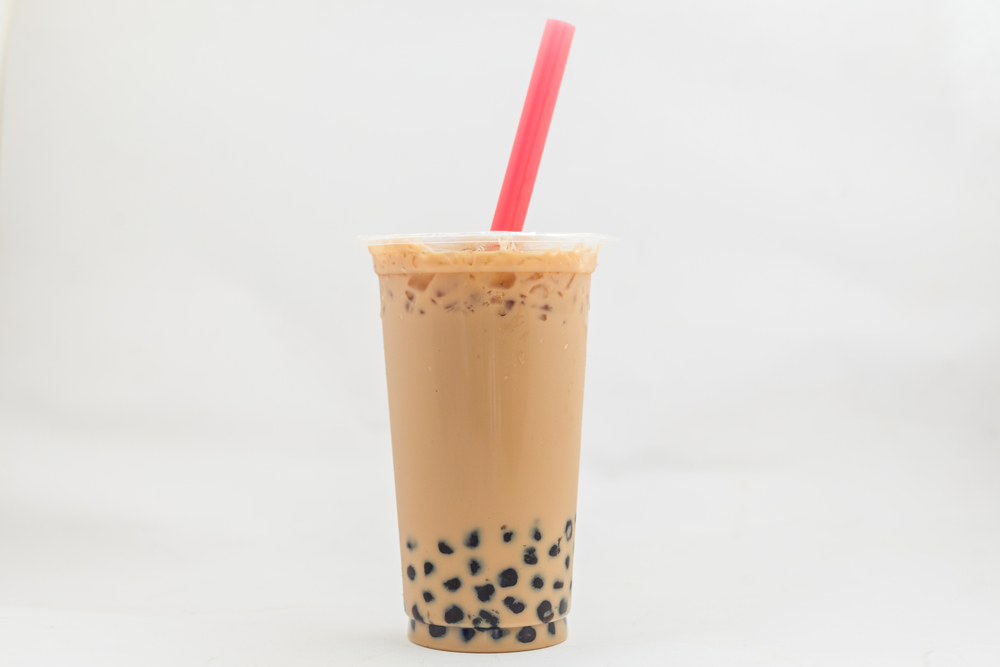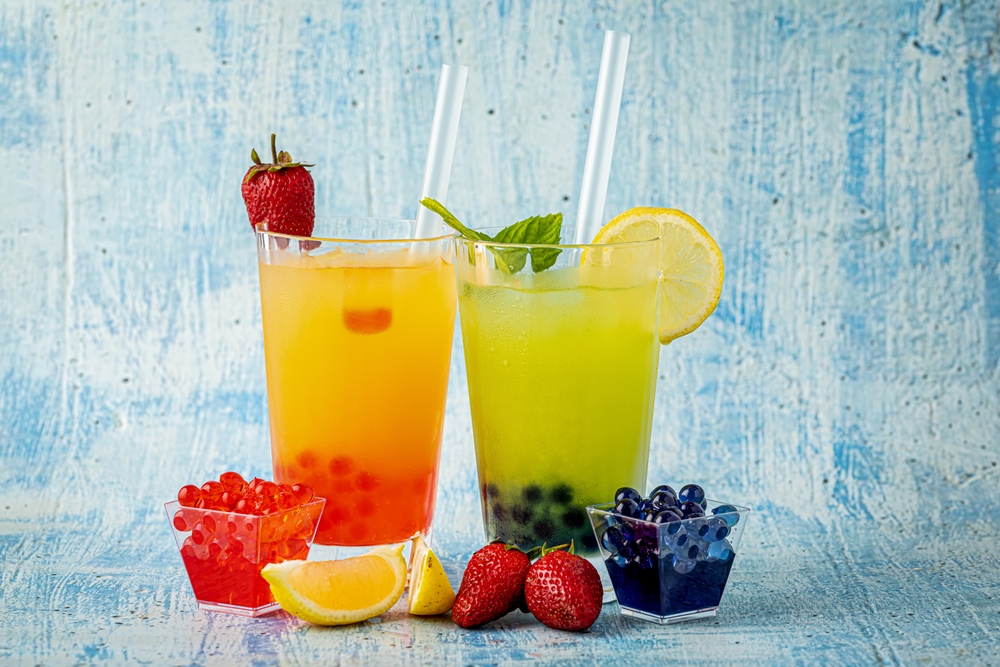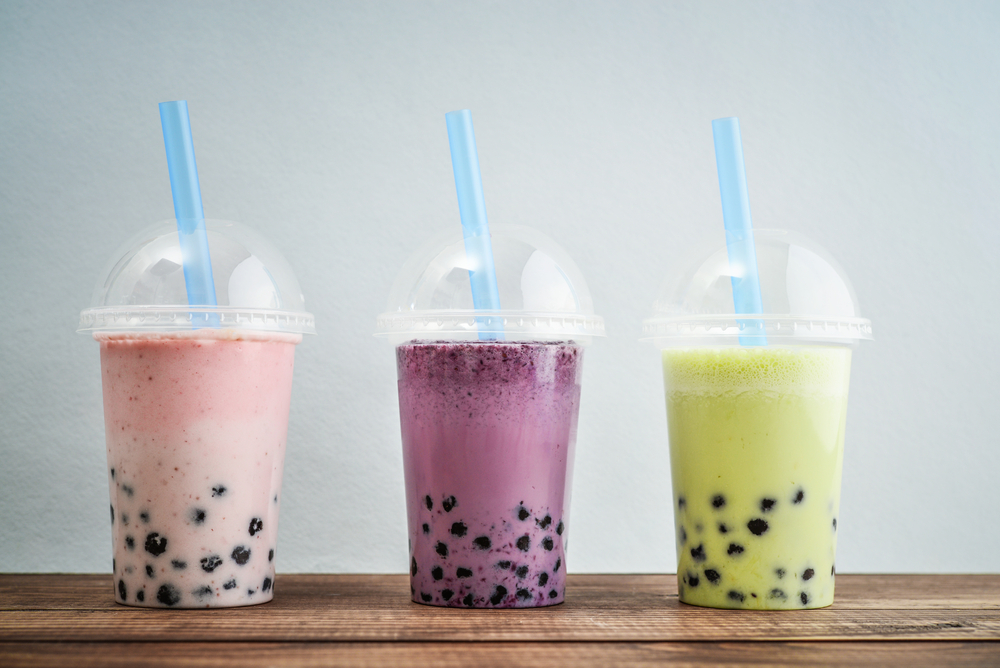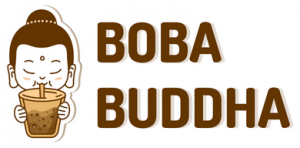Whether you’re health-conscious or just curious, you may wonder which is healthier, a bubble tea vs. a smoothie. While it depends on the exact ingredients, boba smoothies are usually more nutritious because they are made from fresh fruit. However, both options boast health benefits.
Ingredients
Bubble Tea
Bubble tea, also known as pearl milk tea, is a blanket term for many different boba drinks. It can be served several ways, but traditional bubble tea consists of black tea, sweetener, boba pearls, milk, and ice. Of course, there are a lot of different recipes and variations for this delicious Taiwanese drink.
Typically, the drink is served cold over ice, but it can also be served hot. Some variations include fruit, ice cream, fruit syrup, and more.
Milk Tea
One of the most popular variations of bubble tea is milk tea. This drink includes traditional bubble tea ingredients with milk or creamer to give it a creamy texture. Usually, whole milk is used, but there are several substitutes, such as almond milk, coconut milk, non-dairy creamer, or heavy cream. You can enjoy milk tea as a hot or iced tea.

Fruit Tea
Adding fresh fruit to your brewed tea is a great way to give it a sweet, tangy flavor. Some fruit teas contain milk, but not all. When making fruit tea, it will almost always be served over ice, making it a refreshing drink for any time of the day. Hot fruit tea is possible, but some fruits don’t heat well and lose their flavor.

Boba Smoothie
Boba smoothies, though similar to fruit tea, are a bit different. Rather than adding fruit to brewed tea, fruit is the main ingredient, and the ingredients are combined in a blender. This drink is made of frozen or fresh fruit, your choice of milk, a sweetener, and a topping, usually chewy tapioca pearls. The majority of boba smoothies do not include tea.

Nutritional Facts
Bubble Tea
The nutritional information for an average 16-ounce bubble tea is as follows:
| Nutrition | Amount |
| Calories | 240 |
| Fat | 3 g |
| Carbohydrates | 56 grams |
| Sugar | 56 grams |
You should keep in mind that these numbers only account for a basic boba tea. When you add syrups, sweeteners, heavy cream or other creamers, fruit, etc., your calories, sugars, and carbs increase.
Boba Smoothie
The nutrition facts will change based on what types of fruits you use, but here are the average nutrition facts for a 16-ounce mango boba smoothie:
| Nutrition | Amount |
| Calories | 150 |
| Fat | 2 g |
| Carbohydrates | 31 g |
| Sugar | 30 g |
This information is based on the smoothie alone, without toppings. When you add the tapioca pearls, these numbers increase.
Tapioca Pearls
Tapioca pearls are the most common bubble tea or smoothie topping.
Here is the nutrition information for a fourth cup of plain tapioca balls:
| Nutrition | Amount |
| Calories | 100 |
| Fat | 0 g |
| Carbohydrates | 26 g |
| Sugar | 0 g |
Most bubble tea shops add brown sugar or honey to their tapioca pearls to give them a sweeter flavor, which will add in more sugar and calories. Without these sweet additives, tapioca pearls are bland.
Which Option Offers More Health Benefits?
While both offer some health benefits, boba smoothies are fruit-based, making them healthier for most people. Though the fruit does contain a lot of sugar, it is not processed sugar, making it healthier to drink.
Some benefits of boba smoothies include:
- Increased fiber intake
- A nutritional balance of fats, carbs, protein, vitamins, and minerals
- Help managing food cravings
- Can be a meal replacement
If there are added sugars, the nutritional value of the smoothie decreases. However, there are plenty of ways to make a healthy boba smoothie. For example, substitute a different topping, such as popping boba or jellies, add less sugar, and leave out the milk or creamer.
Tea-based boba drinks (especially green tea or matcha) also offer many health benefits, but with so much added sugar, it is not healthy to drink bubble tea daily.
Do Bubble Tea Smoothies Have Caffeine?
Because they are fruit-based and not tea-based, bubble tea smoothies do not have caffeine. However, they can provide energy through the natural sugars found in the fruit.
Can You Make Boba Drinks at Home?
Absolutely! Homemade boba drinks are easier to make than you may think. Depending on the recipe, you may need a blender, strainer, or tea kettle, but the recipes are relatively simple overall.
If you are looking for the perfect milk tea, fruit tea, or boba smoothie recipe to make at home, then give these a try:

